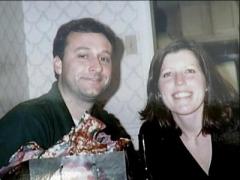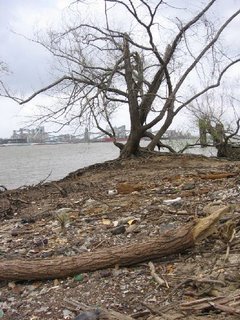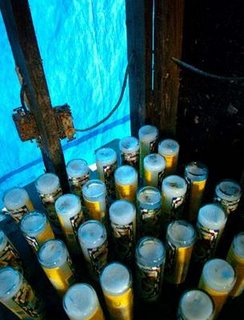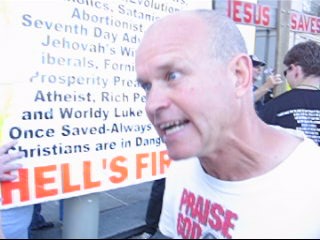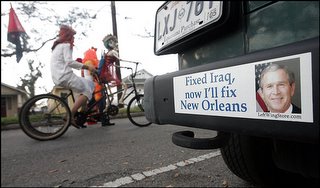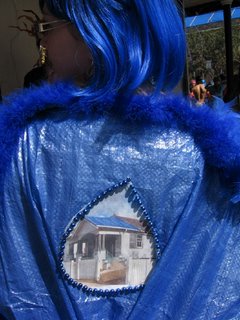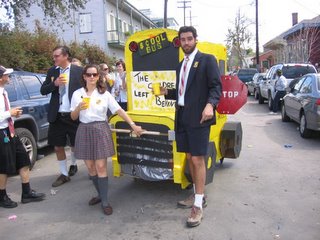Have you? Really, Mr. President? Because I think there be a wee bit more to do before Katrina will be dealt with.
By now, it's a story which most people here are very familiar with, but monkey boy finally had something to say about it.
10,777 FEMA trailers are still sitting in a hay meadow in Bill Clinton's fabled town of Hope, Arkansas.
Hundreds of thousands of hurricane victims remain hopelessly evacuated from their homes, scattered throughout the United States -- six months after the storm -- and the best Bush can come up with is:
Obviously, there's some times when government bureaucracies haven't responded the way we wanted them to. And like citizens, I don't like that at all. I mean, I think, for example, of the trailers sitting down in Arkansas. Like many citizens, they're wondering why they're down there. How come we got 11,000? So I've asked Chertoff to find out, what are you going to do with them? The taxpayers aren't interested in 11,000 trailers just sitting there; do something with them.
And so I share that sense of frustration when a big government is unable to -- sends wrong signals to taxpayers. But our people are good, hardworking people.
E.J. Dionne writes in
The Washington Post that Bush can't simultaneously be a critic of the government, and its leader.
Whether he likes it or not, it was his own administration that bought those trailers and left them to rot in a field in Arkansas while hundreds of thousands of people languish, hoping beyond Hope for the opportunity to return to their homes to begin the process of rebuilding their lives.
Dionne asked:
Why did FEMA spend anywhere from $300 million to $430 million -- the numbers are in dispute -- to buy homes that didn't meet its own regulations? Alternatively, why can't it alter its regulations at least temporarily to use the homes where they are desperately needed?
Many of us are scratching our heads, like
po' boy, wondering about why the decision was made in the first place to drop trailers in front of people's homes at $75,000 a unit, when most homeowners would have gladly taken that money instead to just rebuild their homes.
And by the way ... ahem ... monkey boy is
still claiming,
falsely, that $100 billion has been spent on the Hurricane Katrina disaster, seeming to wish that by rattling off a mysterious big number, he could put the disaster behind him.
The reality is that most of the money is federally-mandated spending -- it's what the government is supposed to do.
The reality is that the non-insurance allocation to date is $67 billion, the biggest chunk of which was spent on hurricane cleanup and paying flood insurance claims for failed federal levees (
da po' boy has the breakdown of allocations).
The cleanup money was paid to mega corporations which skimmed billions from the contracting process, hiring subcontractors, who hired sub-subcontractors, who hired sub-sub-subcontractors, who hired illegal immigrants while The Department of Homeland Insecurity's ICE looked the other way.
At a forum on Wednesday examining the recovery of Kobe, Japan following the 1995 earthquake that killed 6,401 people in 10 seconds, one of the most decisive conclusions reached by researchers Haruo Hayashi and Shigeo Tatsuki was that massive allocations to a few contractors stifled long-term economic growth. 10 years after the disaster, Kobe still hasn't recovered economically.

Meanwhile,
Michael posted a Bob Herbert opinion citing the shocking cost of Operation Enduring Clusterf*** (* for
polimom):
Now comes a study by Joseph Stiglitz, a Nobel Prize-winning economist at Columbia University, and a colleague, Linda Bilmes of the Kennedy School of Government at Harvard, that estimates the "true costs" of the war at more than $1 trillion, and possibly more than $2 trillion.
Not calculating out the costs in the way that Stiglitz and Bilmes did, but just taking into account the $250 billion spent so far in Iraq, the
local cost of the war to Louisiana taxpayers is now up to $2.6 billion. For Baton Rouge, the amount is $123 million. For New Orleans, $234 million. Extend those costs to 2010 like the Stiglitz and Bilmes did, and the costs rise to approximately $10-20 billion for Louisiana.
Anyone have an idea how we could spend that money?
Still in favor of the way Bush is waging his "war against terrah?"
You might be if, like Dick Cheney, you demanded that your
"downtime suite" have all televisions tuned to Fox News (
2Millionth Web Log).







